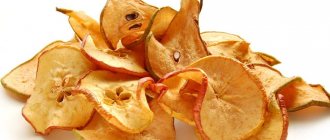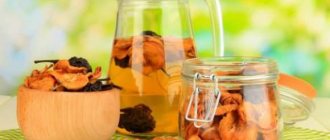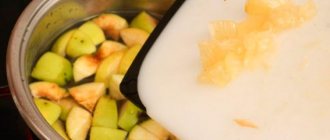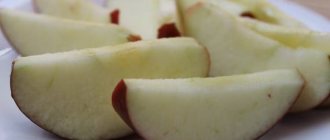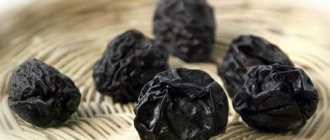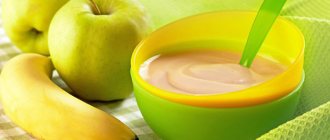The laxative properties of plums have been known to mankind for many centuries, so decoctions, infusions and the plums themselves in their raw form are actively used in folk medicine. Today we will talk about how to prepare a decoction of prunes to help a very small baby finally “do a big thing.” But first, it’s worth clarifying exactly what condition of the child’s gastrointestinal tract should be considered constipation, and not a physiologically normal phenomenon. After all, often inexperienced mothers have difficulty distinguishing one from the other, constantly trying to help the baby establish bowel movements, thereby interfering with completely normal bowel function, which should not be done at all.
Beneficial properties of prune compote
Prunes are rich in substances necessary for the development of the child’s body and strengthening the immune system. Regular consumption of dried fruit as part of compote will lead to positive results:
- will prevent vitamin deficiency in the baby;
- removes toxic substances from the body;
- normalizes and improves metabolic processes;
- destroys pathogenic microorganisms;
- strengthens the heart muscle of the baby;
- improves digestion and prevents constipation;
- will prevent many diseases by increasing the body's protective functions.
Prunes contain a large amount of antioxidants - substances that destroy free radicals (damaging substance molecules). This has a positive effect on the body as a whole and the nervous system in particular - the baby begins to cry much less often. Allergic reactions during administration are observed individually and depend on the child’s body. In this regard, it is recommended to feed infants with one-component compotes. This way you will understand which product your baby reacts negatively to.
Prunes for constipation in infants
Prunes for constipation in infants can be given starting from three months. In order not to harm the baby’s digestive system, you need to choose the right laxative recipe based on dried plums.
Delicious drinks made from dried fruit are useful even if the child has no problems with intestinal function.
Prunes are plums that have been dried in a special way and belong to a specific variety. Proper preparation of the product ensures the preservation of all the beneficial substances of the fruit. Normalization of intestinal function under the influence of prunes occurs due to:
- Plant fiber. Even its minimal amount improves peristalsis of the organ.
- Pectinov. These substances neutralize waste and toxins, and then gently remove them from the body.
- Organic acids that accelerate metabolic processes in the body.
- Magnesium, potassium, phosphorus, iron, sodium. These microelements have a positive effect not only on the functioning of the gastrointestinal tract, but also on the entire body as a whole.
Using prunes for constipation in infants allows you to gently stabilize intestinal function. Under the influence of drinks made from dried fruit, colic and pain do not occur; on the contrary, the process of passing gases improves in children, which has a positive effect on their well-being.
How and when to give prunes to babies
You can give prunes to an infant in several forms:
- Decoction and infusion are used starting from 3-4 months.
- Compote is given when the baby is 5-6 months old.
- Puree is introduced from about 6-7 months.
The age limits given above are arbitrary. When introducing a new product, even a drink, into the diet, the mother must take into account the presence of allergic reactions and the individual characteristics of the digestive tract.
The younger the baby, the more careful you need to use prune drinks for constipation. In case of persistent constipation, it is not forbidden to give an infusion of dried plums to a newborn child, but its concentration should be very minimal.
In this case, the drink is given in the amount of one spoon before feeding and then, over the course of several hours, how the child’s digestive system reacted to the new type of food is assessed.
The mother of an infant can also eat prunes. If the baby receives mother's milk, then some of the valuable substances will certainly enter his body. A woman should start introducing two or three pieces into her diet; it is advisable to consume dried fruit 2-3 times a week.
Rules for preparing prune dishes for infants
For constipation in children, dried fruit can be used to make really tasty drinks with a laxative effect. The first thing you need to do for this is to choose a high-quality dried plum, it should be:
- Meaty and soft to the touch.
- Black color.
- Shiny, but not slimy.
Before use, dried fruit must be washed in several waters. Some nutritionists advise purchasing dried fruit with seeds; it retains more nutrients. It is best to store the product in the refrigerator.
Choosing the right prunes
If you decide to make dried fruit compote yourself, carefully select the ingredients - they must be of high quality and natural. By choosing low-quality prunes, you will harm your baby instead of strengthening his immunity.
When choosing a product, pay attention to the following parameters:
- Dried fruit for compote should not be prepared by smoking. In the process of creating such a product, liquid smoke is used. It contains substances that make it a strong carcinogen - a factor that triggers the development of malignant tumors;
- pay attention to the color of the dried prunes. A high-quality fruit filled with healing substances should be black. If there is a gray coating on the surface of the dried fruit, then the product has been treated with glycerin. Brown color indicates that the fruit was doused with boiling water or treated with caustic soda. In both cases, the fruit loses most of its vitamins and microelements;
- choose prunes with a matte surface. This ensures that the fruit has not been treated with synthetic fat or sulfur dioxide. A product processed with these ingredients looks much more attractive than prunes that have not been subjected to any processing. However, for a child’s body, synthetic substances can be toxic and lead to poisoning;
- texture and taste are equally important parameters that are worth paying attention to. The taste of high-quality prunes should be sweet. It may contain a slight, barely noticeable sourness. A bitter taste indicates that the drying was carried out incorrectly. Dried fruit with a loose texture and mucus should not be chosen - the listed characteristics indicate the low quality of the product;
- When buying prunes, pay attention to their contact with skin and water. Take the fruit in your hand and twist it slightly. If the product you choose is of high quality, then there will be no marks left on the skin. Otherwise, the hand will turn dark. The same thing will happen with water if you immerse fruit in it. A high-quality product will develop a white coating upon contact with water.
Buy products from trusted retail outlets and in bulk. Checking the quality of a packaged product is problematic - most stores do not have this option. And in spontaneous markets they can sell low-quality goods.
How to make prune compote for a baby
To prepare prune compote, take elastic black fruits (10 pieces), 300 ml. filtered water and sweetener in the form of honey (in the absence of sensitivity and allergic reactions in the child). The recipe itself looks like this:
- The prunes need to be sorted and washed thoroughly in warm (not hot) water.
- Take a thick-walled pan and place dried fruits in it. Fill the food with cold water.
- Bring the water to a boil over low heat, or low if your stove is electric.
- Continue cooking the prunes over low heat. Let the dried fruit sit for 20 minutes, then add honey or one of your chosen sweeteners.
If you want to give prune compote to a six-month-old baby, we recommend removing the sweetener. It is better to give children under 12 months a compote made from one component. It is not recommended to overload compote with unnecessary ingredients. Feed your baby small doses and monitor his reaction to a new food. An allergic reaction can be detected if the compote is made from only one component.
Prunes for babies for constipation: is it possible to make a decoction while breastfeeding?
The healing properties of prunes have been known for a long time; for example, in folk medicine it is used as a laxative. Decoctions, infusions, compotes are even given to infants for medicinal and health purposes.
Prunes have a large amount of vitamins, stimulate the gastrointestinal tract
The benefits of prune decoction for children
For a small child, prunes are a healthy product that practically does not cause allergic reactions. Pediatricians allow it to be administered in small quantities as an additive in complementary foods from the second half of the year. It is most suitable for babies who often have constipation; in such cases it is used as a mild laxative.
Despite the undoubted benefits, nutritionists advise using prunes with caution. A child may experience digestive disorders due to vitamin-rich fruits. Therefore, at the very beginning, prepare a weak decoction of prunes for babies.
For your information. Boiled fruits can be given to the baby for health improvement at four months, and purees and compotes for nutrition at six months. Pediatricians warn that prunes should not be included in the first complementary foods, even if the baby is bothered by constipation. This can only be done after vegetables.
Composition and nutritional value
Dried plums are valued for their large amounts of ascorbic acid, vitamins E and B, phosphorus, copper, calcium, and magnesium. It contains enough citric, malic and other acids, as well as fructose and glucose, necessary to replenish energy.
The ballast substances of dried fruits stimulate intestinal activity and are a natural remedy for constipation, which does not cause addiction or side effects.
What is prune decoction used for?
Prune puree for babies - how to introduce it into complementary foods
Wanting to diversify the baby's diet, the mother should take into account that the functioning of the gastrointestinal tract has not yet been fully established, so loose stools or constipation often occur. Sometimes the baby cries, and the parents cannot understand what is happening. Pediatricians explain that the baby may be bothered by flatulence and bloating, and advise introducing dried fruits in a light form, such as compote, decoction or infusion.
Compote and infusion of prunes support the activity of the baby’s gastrointestinal tract
Prune compote
Prune compote is considered a good remedy for treating constipation in young children. It is recommended that after the baby gets used to the one-ingredient drink, combine it with other dried fruits: dried apricots or raisins.
Prune infusion
Prune infusion is a unique remedy for combating many types of bacteria. Pediatricians say that the beneficial substances in the infusion have a positive effect on the functioning of the cardiovascular system.
Important! Explaining whether prunes can be administered when breastfeeding a newborn, pediatricians do not prohibit using it as an infusion. However, they warn that excessive consumption of dried fruits causes diarrhea.
Is it possible to give a decoction while breastfeeding?
Hercules decoction for infants with milk and water
The reason why dried fruits are not recommended as the first complementary food during breastfeeding is considered to be increased gas formation in the baby, accompanied by abdominal pain.
Sometimes situations arise in which you need to help a baby suffering from persistent constipation.
In case of emergency, if a baby is constipated, a decoction of prunes in small doses (half a teaspoon) will help so as not to cause digestive upset.
Advice. It is not recommended to give the decoction to babies under one year of age who are on breastfeeding, with frequent loose stools and elevated hemoglobin levels. In other cases, these dried fruits bring only benefits.
At what age should you give the decoction to your baby?
Chamomile tea for babies from 0 months
When answering mothers about how many months to give prune decoction to a child, some pediatricians do not support the early introduction of dried fruits into the diet. They believe that if the baby is on guard, complementary feeding is not needed until six months.
WHO recommends at what age prunes can be given to infants - at six months. Moreover, before introducing this product, which has a pleasant taste, the baby should try other fruits and vegetables.
With mother's milk, the beneficial properties of prunes can enter the baby's body.
Infants two to three months of age who suffer from constipation may receive laxatives from prunes in their mother's milk. When breastfeeding a newborn, it is beneficial for her to eat 4-5 pieces or drink a prune drink.
How to prepare prune decoction
When the time comes for complementary feeding, prunes are given to babies as a decoction or compote with caution and in small quantities. With the correct cooking technology, dried fruits are softened and boiled in different ways.
Important! All drinks from dried fruits should be prepared weakly concentrated, that is, the smaller the child, the fewer fruits are taken for the drink.
How to brew correctly
Prunes are brewed in the usual way. Before preparing the decoction, the fruits should be rinsed well with boiled water, the seeds should be removed and doused with boiling water.
Then add water in the proportion: one hundred grams of fruit to two glasses of water, and bring to a boil. Boil the broth for 15 minutes and leave for an hour.
The baby should be given it in the first half of the day to see the reaction to the drink. One teaspoon is enough for a small child.
Advice. The fruits have an attractive taste, so it is not advisable to add sugar to drinks.
Compote recipe
To prepare compote, you can take the following recipe: rinse two hundred grams of dried fruits thoroughly and add a liter of water. Bring the compote to a boil and cook over low heat for 20 minutes. Then cool, strain and offer the baby a 50 ml portion.
Infusion recipe
The infusion is recommended to be given to infants from the age of three months if they have digestive problems. Infusion recipe: wash 4-5 pieces of fruit thoroughly, brew with boiling water in a thermos and let it brew for several hours. After filtering, the child is given half a teaspoon to drink. With age, the portion of the drink increases.
Prune infusion is a good remedy for eliminating digestive problems in a child.
Norms of prune decoction by month to year
In the complementary feeding scheme, prunes and plums are in the same position, but their use has some nuances. For complementary feeding in the summer, plums are given, which have a less pronounced laxative effect; prunes are used in the winter season.
Nutritionists have determined how much decoction can be given to a child:
- 6 months – the norm is 50 ml;
- 7-12 months – the norm increases to 60 ml.
Pediatricians do not recommend sharply increasing the portion of the decoction due to its laxative properties.
Advice. You should pay attention to the stool - if it becomes liquid, the portion should be reduced.
How often to give
To prevent painful digestive disorders, it is recommended to include prune crumbs in the menu 1-2 times a week. It is useful to alternate them: give puree at one feeding, compote at the second. If the stool is disrupted, prunes are excluded from the menu.
Important! It is possible to increase the portion only under one condition - constipation. Then the drink is given to the baby until the condition improves, but not more than the prescribed norm per week for all fruits - 100-120 g.
Quantity of prunes
Due to their properties, prunes are not included in the number of products that make up a child’s daily diet. Therefore, it is important to calculate the amount so as not to cause bowel upset. For the first acquaintance with a new taste, the baby is offered half a teaspoon of puree or 5 ml of decoction, then the serving size is increased.
What can be combined with
To diversify your baby's nutrition, it is useful to add a little prunes to dessert or give them in combination with porridge. Experienced mothers can cook prunes with meat in the second half of the year.
Most kids like this combination with their usual dishes, as plum gives them a new taste. However, there are infants who do not take the product.
There is no need to force the dish; it is better to come back to it later.
Prunes are useful to combine with cereals and desserts
Possible nutrition problems
The main contraindications to eating prunes are problems such as allergies and obesity. Therefore, it is better to coordinate its introduction into baby food with a pediatrician.
Important! Experts warn that you need to be careful when purchasing dried fruits at the market or in a store, as they can be treated with chemicals for beauty. In this form, the fruits can harm the child, causing allergic reactions. It is much healthier to prepare dried plum product with your own hands.
Signs of allergies
Dried plums are not considered a strong allergen, but allergic symptoms may appear unexpectedly after eating them. Experts say that allergies arise from improper processing and storage, and not from the product. This is what causes reactions such as skin rashes and indigestion.
For your information. According to medical indications, food reactions to prunes occur in those children for whom southern fruits and cherries are allergens.
Prunes, having a high content of vitamins, strengthen the health of a small child. The main thing is to correctly introduce dried fruits into a child’s diet, taking into account their special properties.
Source: https://kpoxa.info/zdorovie-pitanie/otvar-chernosliva-dlya-grudnichka.html
Compote of prunes and dried apricots
If the child is already one year old or will soon be 12 months old, sweeteners and other components can be added to the compote. One of the healthiest ingredients will be dried apricots - a dried fruit made from apricot fruits. This product saturates the body with essential microelements and significantly improves heart function.
To prepare a compote of dried apricots and prunes, take 10 dried fruits of each type, a liter of filtered water, and a natural sweetener. The compote preparation algorithm is as follows:
- Rinse the fruits in warm water and, if necessary, replace damaged dried fruits with whole ones;
- Soak the fruits for half an hour in a deep container with warm water;
- Prepare the water. Pour the liquid into a thick-walled saucepan and bring to a boil;
- Carefully place the dried fruit into the pan and cook for 20 minutes. The foam that forms during the cooking process must be skimmed off.
Children under one year old should be given compote in small doses. Monitor the reaction: if signs of an allergy appear in the first half hour, stop giving the child compote.
Compote of prunes, raisins and dried apples
Take equal parts of dried apples, prunes and raisins. To taste, add sweetener in the form of sugar (if the baby is at least 12 months old), fructose or honey. Prepare compote for a 6 month or 1 year old child as follows:
- Sort out the dried fruits and rinse thoroughly under running warm water;
- Boil a liter of water and put dried fruits in it;
- Boil the fruits for 20 minutes;
- Infuse the compote at room temperature for at least 12 hours.
An apple is rich in useful minerals, prunes will help a child with constipation, and raisins will minimize colic.
Contraindications
Having previously consulted with the local pediatrician, prunes or their decoction can be included in the baby’s menu, but not earlier than three months, since an allergy may develop due to the premature introduction of dried fruits. The reasons for early complementary feeding may be problems with stool, for example, with regular constipation, which causes anxiety for the child, or with severe vitamin deficiency. Before you start using prunes, you should make sure that the child has no contraindications: allergies or diabetes. A good specialist in this case will help assess your health status and give competent advice.
Useful: How, when and in what quantities to introduce egg yolk into complementary foods?

